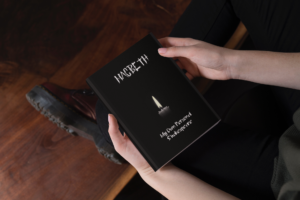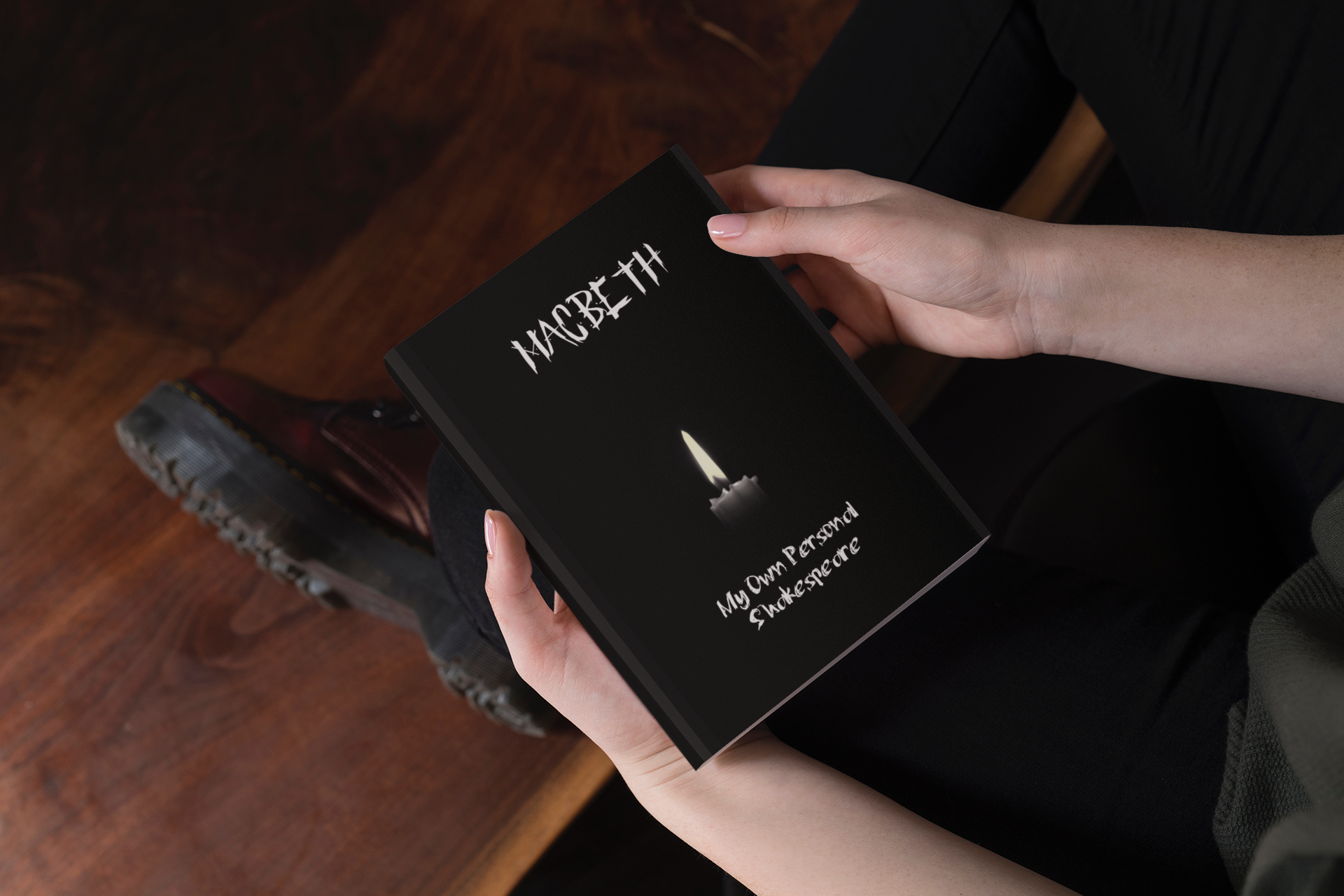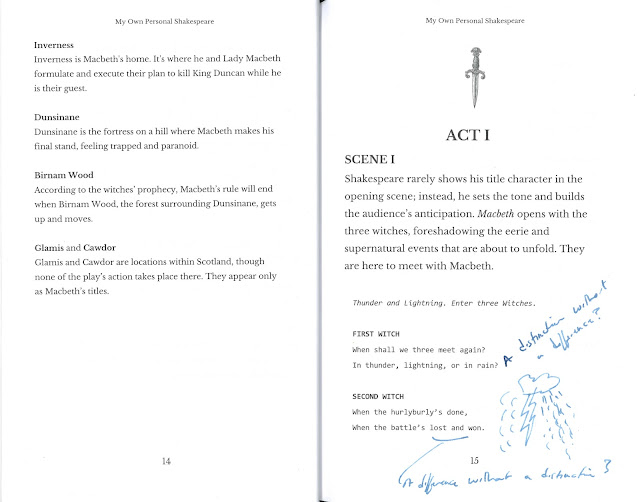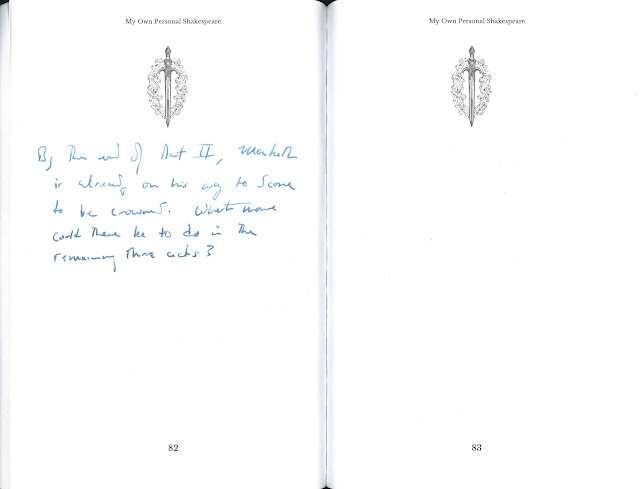
I’m thrilled to announce an exciting giveaway contest for our latest release, My Own Personal Shakespeare: Macbeth. This edition offers a unique experience, allowing you to engage deeply with the text while adding your own personal annotations.
How to Enter:
It’s simple! To participate, all you need to do is leave a comment answering one intriguing question:
Which Shakespeare play should I write about next?
I chose Macbeth as the first volume because my daughter inspired the entire project by coming out of her first college Shakespeare class and asking, “Can I get my own copy of Macbeth? I don’t care which edition, I just want one of my own that I can write in because I have thoughts.” Thus the idea was born for an edition of Shakespeare that strips away hundreds of years of other people telling you what to think, replacing it with plenty of room for you to discover Shakespeare in your own way and at your own pace.
But what should we do next? Hamlet? Romeo and Juliet? Twelfth Night, Much Ado? You tell me!
Two Winners Will Receive Free Copies of My Own Personal Shakespeare: Macbeth
I have two copies of my book to giveaway. (Amazon’s actually very good about “author copies,” so if this contest goes well, I’ll probably do it again soon!). All you need to do is answer the question in the comments and a few other necessary rules:
- Submit your entry by the deadline: Friday, June 28, 2024
- Provide a valid email address so I can contact the winner.
- Be willing to provide me with a shipping address where I can send the book, of course.
- Shipment to the continental US only. Sorry, international audience. Shipping costs take all the fun out of it.
Look Inside!
The whole point of our new series is about making it your own. There’s plenty of whitespace on every page, and blank note pages between all the acts. Check it out!
Enter Now for Your Chance to Win
Who doesn’t love free books? Free Shakespeare books, even better! We’ve taken the first step on what’s hopefully going to be a long and fruitful journey. Now you can help us decide the next step! Enter today!







Hamlet makes the most sense from a commercial standpoint. Also, it’s a play that creates plenty of internal questioning. Perfect for the type of thing that you’re working with.
I wonder, though, if trying to connect this with typically assigned reading makes more sense. If Romeo and Juliet is most often covered in school classes, then an item like this may have more of a built in audience.
Hello! I’m unclear on how to enter your contest, but perhaps I’m expected to leave my answer here. I would love to see your next Bard book be aboutTwelfth Night. I’m biased, as it is my favorite of his comedies (I first saw it portrayed in Berkeley, CA, and the setting was Mardi Gras – SUPERB). I would love to see how you discuss Malvolio.
You did it right, Jeniene! I have updated the post to make the instructions more clear. Good luck!
I tell you, Peder, if you had any idea how many times over the years I’ve had that exact debate in my head. I’ve wanted to publish on Shakespeare for years, and the “Hamlet’s the more interesting choice but Romeo and Juliet’s the more popular and obvious choice” question rears its ugly head every time. I think R&J hits more beginners – entirely because most of them have it forced upon them in school – while Hamlet shows us more about why we continue to study Shakespeare in the first place.
Merry Wives of Windsor, because it is so beautifully pro women without being over the top
A Midsummer Night’s Dream. I think the key plots (Theseus and Hippolyta, Oberon and Titania, Titania and Bottom, the four lovers, and the Rude Mechanicals) are dense, have been played differently in various productions, and thus will require lots of room for notes. Also, I personally think Puck has a arc as an AI, and I’d love to see if I can connect that 🙂
I’m all for Hamlet. It’s my favorite play, and I think it could benefit from your streamlined approach.
Duane, just excited to see your continued journey in this area. best wishes to the success of this book and beyond.
Hi Sudeep! Thanks for checking in! I hope that life’s been good to you over the years.
I’m not participating in the contest—I have two copies already (one for home and one for work)—but I want to encourage the contest and the conversation!
Hamlet may have the most notes in most editions. A “My Own Personal Shakespeare” version of that would be shockingly bare.
But I agree with Peder that Romeo and Juliet might be more commercially viable. And that play’s readers have lots of thoughts.
Julius Caesar could be another option. It’s a better play, but it may also be less frequently assigned in high school classes.
This is the challenge, isn’t it? If you’re here, chances are you’ve got a reasonable amount of Shakespeare under your belt, and have had a chance to explore multiple plays and pick a real favorite. We have to be able to put ourselves back into the minds of those beginners, much like my daughter, who get to experience those wonderful life-changing “Aha!” moments as they discover the plays for the first time. I hope with this series to reinvent those first steps on the journey and show these wayfarers that the words of those who came before them are not the final word. Insight and epiphany can come from anywhere and anyone.
Precisely, SG.
I wonder if there are some texts that would require some editing–even if there aren’t any notes. King Lear springs to mind. I might be a bit lost if thrown in without any notes to help.
It’s definitely a concern. I look at some words and think, “Can’t I give the reader just a little hint? They’re literally never going to understand this without a nudge.” But that opens a door to a slippery slope, and suddenly each page becomes “Ok, which words am *I* going to be the one to decide need more explanation?” and in the interest of covering all my bases, I’d be back to having pages littered with glossary terms and footnotes. I’m thinking that larger, more complex plays may merit at least a Glossary section in the back, at least that way it doesn’t interfere with the experience of the play itself and can be referenced at the reader’s discretion.
Lear is the volume that would have my own personal tears on it, because out of the entire beloved canon, that’s the play that lives in me most deeply. But when I think of the friends and relatives I’d like to give your next volume to, my vote veers toward Hamlet…or maybe Much Ado.
One way or another, I’m looking forward to getting my hands on Macbeth!
King Lear would be my personal choice, but I agree with the others who mention that Romeo and Juliet or Hamlet might be more commercially successful. Thanks for the blog. I’m enjoying it!
King Lear has always intrigued me and the one I would want to review again. It seems it tells something different for each age. Of Man and Mankind.
I know it almost has to to be Hamlet. But I’m going with Love’s Labours Lost because it’s my current obsession and because it relates very strongly to today’s gender wars.
MAAN is a fav. deaccessioning my collection of tree corpses so send it to eugene public library
Downtown Library
100 W. 10th Avenue
Eugene, OR 97401
WINNERS HAVE BEEN CHOSEN AND CONTACTED. Thanks everyone for playing! I hope to do it again when we release our next volume this fall!